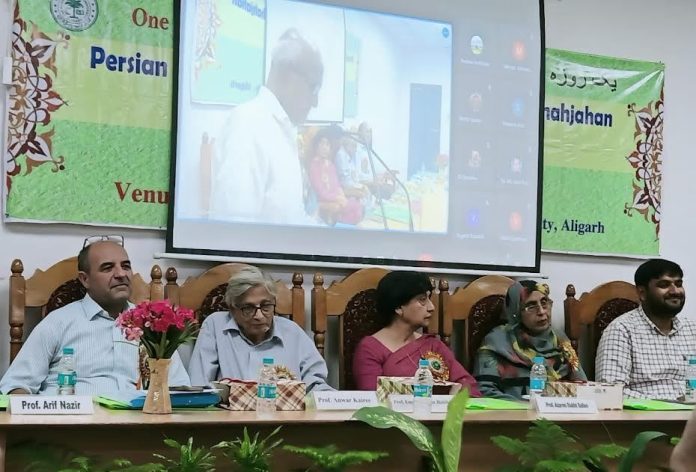Aligarh, Sep 1: The Department of Persian, Aligarh Muslim University organised a one-day international seminar on “Persian Literature Produced during the reign of Shah Jahan”.
Addressing the inaugural session, Professor Irfan Habib, Professor Emeritus of History at AMU said that it was during the reign of Shah Jahan that a text like Dabistan-i-Mazahib, was compiled in 1652 by Khusrau Isfandiyar, head of a Parsee sect, which has no parallel in the contemporary world of the 17th century.
“It is a unique work which contains a critical study of various religions which include world religions like Judaism, Christianity, Buddhism, Zoroastrianism and Islam. Another characteristic feature was the translation of 52 Upanishads by Dara Shikoh, son of Shah Jahan, which astonished the European intellectual world with its unique philosophical speculation”.
He also sought to highlight the ideological differences between Emperor Shah Jahan and his great grandfather Akbar to whom he admired deeply yet the two were very different in outlook. These differences are also reflected in the official historiographies of the two, Akbarnama and Padishah-nama, Prof Irfan Habib pointed out.
The Chief Guest, Professor Anwar Khairi (University of Kabul) remarked that each time Shah Jahan visited Afghanistan mainly to oversee the Central Asian military campaigns, he laid the foundations of a number of monuments, mosques and gardens which dotted the landscape of modern Afghanistan to date and thus enriched the cultural life of the region which constituted one of the province of the empire.
In her welcome address, Professor Rana Khursheed, Chairperson, Department of Persian and Coordinator of the International seminar said that the Mughal Emperors are known for their multifaceted patronage of arts, architecture and literature. Babur, a cultured Timurid Prince, loved gardens and books and patronized scholars, writers, architects and calligraphers and wrote his own beautiful biography called Baburnama (Book of Babur).
The second Mughal emperor of India Humayun Padishah’s love of books, poetics, astrology, astronomy and painting is well attested. His son and successor Akbar, the greatest of the Mughal emperors of India, inspired by the Sufi-saint Shaykh Salim Chishti built Fatehpur Sikri, the ceremonial capital of his empire which remains the most enduring architectural legacy of his reign. He is also credited with providing a long-lasting administrative framework to his successors. Like his father Akbar, Emperor Muḥammad Nūr al-Dīn Jahāngīr was an accomplished patron of literature, decorative arts, architecture and painting. Under his court patronage and that of his father the Mughal School of painting, one of the richest and most productive schools in the history of Indian and Islamic painting emerged.
Professor Azarmi Dukht Safavi said that India was an integral part of Persianate cultural zone. The period witnessed transformative changes in Persian language and literature, especially the emergence of the Sabk-i-Hindi as embodied in the poetics of great poet Mirza Bedil.
Professor Arif Nazeer, Guest of Honour and Dean, Faculty of Arts described multiple portrayals of Emperor Shah Jahan in the contemporary Sanskrit literary tradition by citing numerous Sanskrit poetical writings.
Delegates from around the country as well as from other countries including Turkey, Iran, Bangladesh and Tajikistan participated in the seminar.
On the occasion, one bulletin and two catalogues were released, produced by Professor Gulfishan Khan with Aftab Ahmad, Assistant Professor and Saleem Ahmad, Senior Curator as Assistant Editors. These are Bulletin of Archaeology, Catalogue of Antiquities of Jakhera: The Earliest Urban Centre of Ganga Valley and Catalogue of Aligarh Antiquities, published under the auspices of the Archaeology Section, Centre of Advance Study Department of History, Aligarh Muslim University.
The proceedings were conducted by Dr. M. Qamar Alam, while Dr. M. Qaiser proposed a vote of thanks.




